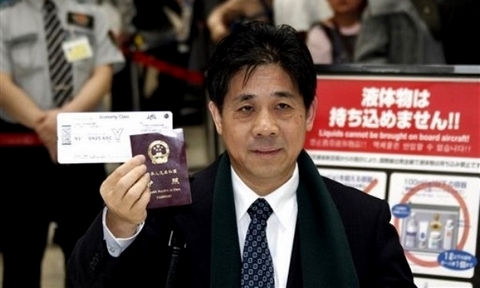After he was denied re-entry to China eight times, Feng Zhenghu lived in Tokyo’s Narita Airport for 92 days in 2009-2010. Now Feng is telling the story of his airport odyssey on his blog, and CDT is translating his account. This is the ninth installment. Read previous installments here.
November 11, 2009
I received a phone call from China. The voice belonged to a young man who asked about my situation and recommended that I set up a Twitter account to update in real time. What is Twitter? Who was this young man? I didn’t have an answer for either question and I didn’t ask for his name during our call. Instead, I was immediately willing to place my trust in this “stranger.” I needed the support of information technology—I needed to broadcast my predicament in the airport quickly and widely.
I told him that my computer couldn’t pick up the Wi-Fi signal from the airport transportation lounge. It was probably because I was next to the Immigration Control office. I hadn’t brought a USB wireless network adapter, and I couldn’t connect to a mobile network, so it was impossible for me surf or send documents. I had been copying documents onto my Japanese cell phone, then using the email function to forward messages to my friends, who would upload them onto the Internet for me.
During the day I was sitting in the cramped immigration hall, facing an endless stream of tourists coming into Japan. I didn’t have the space to open my computer to copy documents and forward them on to my friends. It was technically impossible for me to send out timely updates. Besides, I hadn’t gotten my bearings in this place yet. I needed to practice self-restraint and not get ahead of myself. I knew how to write, but I wasn’t accustomed to Twitter’s 140-character limit. The man on the phone said he would help me by using my name to register for a Twitter account, and sending tweets on my behalf.
We decided that I would do my best to write my diary in 140-character passages, describing the situation and my feelings. Every evening at ten o’clock I would email my diary to him, and he would tweet that day’s entry one passage at a time. Actually, I had no idea what he was posting, or how, because there was no way for me get online. My intuition, however, told me that he was someone that I could trust, an Internet-savvy person with foresight. We were going to create a fantastic story: after a few days, the whole world would be browsing my Twitter page, and the only one who wouldn’t be able see it was myself.
I believe in the power of the Internet. Ever since I had been turned back from home on June 7, I had relied on the power of the Internet promote my right of return. From the very beginning, the websites Huxianweiquanwang [Protect the Constitution and Human Rights] (护宪维权网), Tianwang (六四天网) (managed at the time by Zhang Tingguo), Weiquanwang [Rights Defense Net] (维权网), and China Free Press (参与) all provided support for my right of return movement. Later on Boxun, The Epoch Times, and other websites started to cover my activity. I was doing something that no one had ever done before, and there were many people who didn’t believe, who didn’t have faith. From the beginning, I could only stand up for myself. Making my last stand at the Narita Airport, I discovered I needed the Internet more than ever.
Note: After my friend brought me a USB wireless network adapter on November 29, I finally was able to log onto Twitter. When I did, I discovered that the Internet whiz who had helped me was none other than the famous Internet activist Isaac Mao. I asked him to keep managing my Twitter account and posting tweets for me. It wasn’t until my second day back home that he finally told me my Twitter password and I started tweeting myself. [Chinese]
Translation by Nick.







